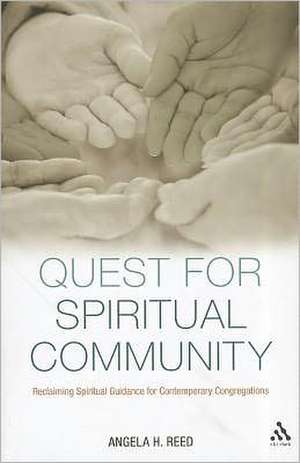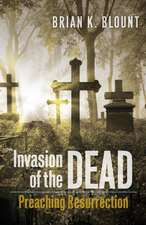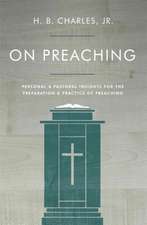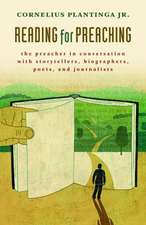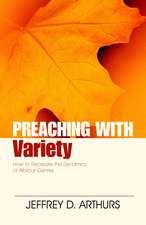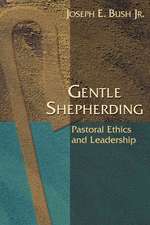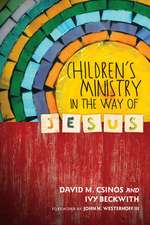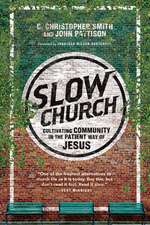Quest for Spiritual Community: Reclaiming Spiritual Guidance for Contemporary Congregations
Autor Angela H. Reeden Limba Engleză Paperback – 24 apr 2011
Preț: 178.65 lei
Preț vechi: 207.51 lei
-14% Nou
Puncte Express: 268
Preț estimativ în valută:
34.19€ • 35.27$ • 28.53£
34.19€ • 35.27$ • 28.53£
Carte tipărită la comandă
Livrare economică 26 martie-09 aprilie
Preluare comenzi: 021 569.72.76
Specificații
ISBN-13: 9780567038838
ISBN-10: 0567038831
Pagini: 208
Ilustrații: 1 illus
Dimensiuni: 152 x 226 x 18 mm
Greutate: 0.34 kg
Ediția:New.
Editura: Bloomsbury Publishing
Colecția T&T Clark
Locul publicării:London, United Kingdom
ISBN-10: 0567038831
Pagini: 208
Ilustrații: 1 illus
Dimensiuni: 152 x 226 x 18 mm
Greutate: 0.34 kg
Ediția:New.
Editura: Bloomsbury Publishing
Colecția T&T Clark
Locul publicării:London, United Kingdom
Caracteristici
This book is based on spiritual guidance practices in actual congregations. Readers will learn about the strengths and pitfalls of introducing these practices in their congregations.
Notă biografică
Angela Reed is Assistant Professor of Practical Theology and Director of Spiritual Formation at George W. Truett Theological Seminary, Baylor University. She holds a Ph.D. from Princeton Theological Seminary and has experience in spiritual direction and pastoral ministry.
Cuprins
Introduction:
The introduction will discuss the widening gulf between religion and spirituality in contemporary culture.
Chapter 1: Understanding the Contemporary Spiritual Search: Spirituality for Communities in a Culture of Individuals
The first chapter will provide a description of the contemporary spiritual quest for congregations and their leaders who are frequently ill-equipped to understand the spiritual environment in society around them. Seminaries generally provide students with many more tools to read Scripture, church history, and theology than to "read" contemporary culture. The sociological frameworks of Wade Clark Roof, Robert Wuthnow, and Christian Smith offer insights into the contemporary cultural milieu and provide direction for recovering ancient practices of spiritual guidance for the current context in a manner that is rooted in the communal formation of the congregation.
Chapter 2: Hearing their Stories: Spiritual Guidance Practices in Congregations
Every chapter will contain the threads of a few stories woven throughout (see the introduction for an example of this.) However, the second chapter will explore the stories of the congregations and seminaries included in the empirical research more fully, highlighting specific dimensions of the impact of spiritual guidance training and practice on congregations and their leaders. Several significant findings will be discussed including: the shaping of pastoral identity, ongoing self-care and personal formation of pastors, parishoners developing a language for spirituality and experiencing God in new ways, personal and communal discernment, the movement from personal formation to missional conviction, etc. This chapter will begin to explore practical insights from those reclaiming spiritual guidance practices. Ultimately, the chapter will consider how spiritual guidance practices impact the congregation's ability to create meaningful responses to the quest culture.
Chapter 3: Historical Models of Spiritual Guidance: Uncovering Practices of Soul Care for Persons and Communities
The third chapter will provide a brief introduction to the development of spiritual guidance practices in recent history, especially with reference to the Protestant context. The chapter will then consider an historical exploration of spiritual guidance in a few specific contexts - snapshots of spiritual guidance at work in communities where it may be least expected. These snapshots will include the role of the anamchara (or soul friend) rooted in Celtic spirituality, the anchorite Julian of Norwich, the early Anabaptists who practiced the ban, and the secretive seminary community guided by Dietrich Bonhoeffer. The result is a discussion of the possibilities of spiritual guidance which challenges the contemporary culture's emphasis on individualistic spirituality. The historical examples point to the possibilities of spiritual guidance practices which nurture both individuals and communities.
Chapter 4: A Protestant Theology of Spiritual Guidance: Insights from Jürgen Moltmann and Miroslav Volf on the Trinity and Christian Community
The theological discussion in the fourth chapter lays the foundation for a Protestant theology of spiritual guidance. Moltmann is a pivotal figure in his development of the social doctrine of the Trinity. His discussion of God's presence in creation fits hand-to-glove with spiritual guidance practice. The description of human relationships which most fully reflects God as Trinity (persons-in-relation) sets the stage for spiritual formation in community. Volf (Moltmann's former student) explores voluntary association in the Christian congregation and works intentionally to counter individualistic tendencies in Protestant ecclesiology. The result is a vision for Christian practice that attends to the personal spiritual quest while remaining accountable to theological convictions about community and mission. A Word on Method: This chapter draws on traditional systematic theologians, however the focus on spirituality lends itself to approaching the ideas in a way that is creative and engages tools such as story and metaphor. At times it will also be important to point to practice (based upon earlier chapters) and then reflect on theological implications (a true practical theological method).
Chapter 5: The Pastor as Spiritual Guide: Becoming a Spiritual Leader of a Congregation
The fifth chapter discusses the possibilities of the role of pastor as spiritual guide. In the empirical research, pastors were virtually unanimous in their opinion that spiritual guidance has become a lens for all that they do in ministry. For many, training in spiritual guidance has been one of the biggest influences in the way they go about the work of ministry. The bulk of the chapter will offer suggestions for providing spiritual guidance through various pastoral tasks including preaching, leading worship, teaching, pastoral care, administrative leadership, etc. Lay leaders will be addressed as well.
Chapter 6: Toward a Congregation-Based Model for Spiritual Guidance: Pragmatic Suggestions for Churches Seeking to Address the Contemporary Spiritual Quest
While the fifth chapter concentrates on congregational leadership, the sixth chapter gives attention to the congregation as a whole. A model for congregation-based spiritual guidance will be explored more fully. After reading this chapter, congregational leaders should have a sense of how they might start to develop a ministry of spiritual guidance in their contexts. Variations of the model will be considered and possible pitfalls when implementing spiritual guidance practices will be addressed. Practical issues such as approaches to spiritual guidance that attend to males and females, spiritual guidance for individuals and groups, and spiritual guidance for families will be included. These issues are based upon the understanding of the congregation as a primary home for spiritual formation amid a culture in which spiritual experiences are often fleeting.
Conclusion:
In addition to providing a brief summary of key arguments, the conclusion will offer some reflections on key issues seminaries might consider in their attempts to give greater attention to spiritual formation and guidance in the curriculum and in community life. In my perspective, the spiritual formation of seminarians is critical for the ongoing health and growth of the church.
The introduction will discuss the widening gulf between religion and spirituality in contemporary culture.
Chapter 1: Understanding the Contemporary Spiritual Search: Spirituality for Communities in a Culture of Individuals
The first chapter will provide a description of the contemporary spiritual quest for congregations and their leaders who are frequently ill-equipped to understand the spiritual environment in society around them. Seminaries generally provide students with many more tools to read Scripture, church history, and theology than to "read" contemporary culture. The sociological frameworks of Wade Clark Roof, Robert Wuthnow, and Christian Smith offer insights into the contemporary cultural milieu and provide direction for recovering ancient practices of spiritual guidance for the current context in a manner that is rooted in the communal formation of the congregation.
Chapter 2: Hearing their Stories: Spiritual Guidance Practices in Congregations
Every chapter will contain the threads of a few stories woven throughout (see the introduction for an example of this.) However, the second chapter will explore the stories of the congregations and seminaries included in the empirical research more fully, highlighting specific dimensions of the impact of spiritual guidance training and practice on congregations and their leaders. Several significant findings will be discussed including: the shaping of pastoral identity, ongoing self-care and personal formation of pastors, parishoners developing a language for spirituality and experiencing God in new ways, personal and communal discernment, the movement from personal formation to missional conviction, etc. This chapter will begin to explore practical insights from those reclaiming spiritual guidance practices. Ultimately, the chapter will consider how spiritual guidance practices impact the congregation's ability to create meaningful responses to the quest culture.
Chapter 3: Historical Models of Spiritual Guidance: Uncovering Practices of Soul Care for Persons and Communities
The third chapter will provide a brief introduction to the development of spiritual guidance practices in recent history, especially with reference to the Protestant context. The chapter will then consider an historical exploration of spiritual guidance in a few specific contexts - snapshots of spiritual guidance at work in communities where it may be least expected. These snapshots will include the role of the anamchara (or soul friend) rooted in Celtic spirituality, the anchorite Julian of Norwich, the early Anabaptists who practiced the ban, and the secretive seminary community guided by Dietrich Bonhoeffer. The result is a discussion of the possibilities of spiritual guidance which challenges the contemporary culture's emphasis on individualistic spirituality. The historical examples point to the possibilities of spiritual guidance practices which nurture both individuals and communities.
Chapter 4: A Protestant Theology of Spiritual Guidance: Insights from Jürgen Moltmann and Miroslav Volf on the Trinity and Christian Community
The theological discussion in the fourth chapter lays the foundation for a Protestant theology of spiritual guidance. Moltmann is a pivotal figure in his development of the social doctrine of the Trinity. His discussion of God's presence in creation fits hand-to-glove with spiritual guidance practice. The description of human relationships which most fully reflects God as Trinity (persons-in-relation) sets the stage for spiritual formation in community. Volf (Moltmann's former student) explores voluntary association in the Christian congregation and works intentionally to counter individualistic tendencies in Protestant ecclesiology. The result is a vision for Christian practice that attends to the personal spiritual quest while remaining accountable to theological convictions about community and mission. A Word on Method: This chapter draws on traditional systematic theologians, however the focus on spirituality lends itself to approaching the ideas in a way that is creative and engages tools such as story and metaphor. At times it will also be important to point to practice (based upon earlier chapters) and then reflect on theological implications (a true practical theological method).
Chapter 5: The Pastor as Spiritual Guide: Becoming a Spiritual Leader of a Congregation
The fifth chapter discusses the possibilities of the role of pastor as spiritual guide. In the empirical research, pastors were virtually unanimous in their opinion that spiritual guidance has become a lens for all that they do in ministry. For many, training in spiritual guidance has been one of the biggest influences in the way they go about the work of ministry. The bulk of the chapter will offer suggestions for providing spiritual guidance through various pastoral tasks including preaching, leading worship, teaching, pastoral care, administrative leadership, etc. Lay leaders will be addressed as well.
Chapter 6: Toward a Congregation-Based Model for Spiritual Guidance: Pragmatic Suggestions for Churches Seeking to Address the Contemporary Spiritual Quest
While the fifth chapter concentrates on congregational leadership, the sixth chapter gives attention to the congregation as a whole. A model for congregation-based spiritual guidance will be explored more fully. After reading this chapter, congregational leaders should have a sense of how they might start to develop a ministry of spiritual guidance in their contexts. Variations of the model will be considered and possible pitfalls when implementing spiritual guidance practices will be addressed. Practical issues such as approaches to spiritual guidance that attend to males and females, spiritual guidance for individuals and groups, and spiritual guidance for families will be included. These issues are based upon the understanding of the congregation as a primary home for spiritual formation amid a culture in which spiritual experiences are often fleeting.
Conclusion:
In addition to providing a brief summary of key arguments, the conclusion will offer some reflections on key issues seminaries might consider in their attempts to give greater attention to spiritual formation and guidance in the curriculum and in community life. In my perspective, the spiritual formation of seminarians is critical for the ongoing health and growth of the church.
Recenzii
Angela Reed has done churches a monumental favour by reminding us that the ancient practice of spiritual guidance is not just for mystics and monks. Reed places spiritual guidance in the middle of congregations, and moves the task of Christian discernment straight to the top of the list of tasks confronting postmodern congregations. Chock-full of practical strategies and concrete examples, Quest for Spiritual Community re-imagines Christian leadership - not as a source of therapeutic or moralistic advice - but as conduit for practical wisdom, wonder, and awe. All I can say is: it's about time.
Angela Reed honors the contemporary phenomenon of spiritual seeking as a sign of genuine hunger for encounter with the Divine. She claims that historic Christian practices like spiritual guidance can help churches connect seekers to the unfolding mystery of God's presence and activity in the world. Drawing on Scripture, the history of Christian spirituality, and empirical research Reed develops a sound practical theology of spiritual guidance and offers concrete examples of how guidance is practiced in everyday congregational life. Most welcome is her emphasis on the integration of interior and exterior growth, as she demonstrates how spiritual guidance promotes the flourishing of the individual, the community, and the church's mission. This is a wonderfully helpful and insightful book.
Professor Angela Reed offers a unique contribution to the field of spiritual formation studies by making a compelling case for locating spiritual guidance ministries squarely in the midst of congregational life. Though she values (and practices) one-with-one spiritual direction, her deepest passion is for communal formation. Given the stresses and fractures of contemporary life, nothing short of a vibrant community of spiritual practice will satisfy the longings of our hearts and shape the image of Christ in people of faith today. Though many studies in spiritual formation draw upon the rich tradition of Roman Catholic resources, Reed takes the less traveled route by focusing especially on Protestant history and perspectives - mainline, evangelical and Anabaptist-Mennonite streams. Extensive biblical reflections, in-depth exploration of Jurgen Moltmann's theology of formation, as well as on-the-ground research support her vision. Perhaps one of the most unusual features of the book is its exploration of a widely disparate group of spiritual guides - the Apostle Paul, Julian of Norwich, Susanna Wesley, Maria Frelinghuysen Cornell, and Dietriech Bonhoeffer - in search of a sturdy framework for communal formation. Reed demonstrates her own thesis that an improvisatory approach is needed for the future. Pastors and other spiritual leaders will need to be light on their feet - able to read their contexts, draw from deep wells of wisdom and practice, and be open to the Spirit's fresh guidance in order to shape Christians who will authentically be and do God's mission in the world. Practical theologians like Angela Reed give me great hope for the church. Her gentle wisdom, luminous clarity, and passion for the church will guide both congregations and academic institutions into a faith-filled future.
Quest for Spiritual Community is no mere research report... Rather than laying out a rigid programmatic agenda, Reed offers a way to understand the congregation as God's primary locus for spiritual guidance... she is a trustworthy guide who helps us ponder how cultivating spiritual guidance in our congregations might cause spiritual maturity to flourish.
Reed's continual integration of the real-life experiences of the participants in congregational spiritual guidance helped make the text more personal...
By tackling a myriad of complex and intriguing questions, Baylor University professor Angela Reed attempts to place the growing interest in spiritual direction firmly within the context of the local church while simultaneously curbing some of the individualistic strains within the movement as Protestants seek to rediscover the ancient art of spiritual direction/guidance.by seeking to bring the spiritual direction conversation home to its proper resting place in the church, Reed provides a welcome contribution and a much-need corrective to the on-going practices of spiritual direction.
Angela Reed honors the contemporary phenomenon of spiritual seeking as a sign of genuine hunger for encounter with the Divine. She claims that historic Christian practices like spiritual guidance can help churches connect seekers to the unfolding mystery of God's presence and activity in the world. Drawing on Scripture, the history of Christian spirituality, and empirical research Reed develops a sound practical theology of spiritual guidance and offers concrete examples of how guidance is practiced in everyday congregational life. Most welcome is her emphasis on the integration of interior and exterior growth, as she demonstrates how spiritual guidance promotes the flourishing of the individual, the community, and the church's mission. This is a wonderfully helpful and insightful book.
Professor Angela Reed offers a unique contribution to the field of spiritual formation studies by making a compelling case for locating spiritual guidance ministries squarely in the midst of congregational life. Though she values (and practices) one-with-one spiritual direction, her deepest passion is for communal formation. Given the stresses and fractures of contemporary life, nothing short of a vibrant community of spiritual practice will satisfy the longings of our hearts and shape the image of Christ in people of faith today. Though many studies in spiritual formation draw upon the rich tradition of Roman Catholic resources, Reed takes the less traveled route by focusing especially on Protestant history and perspectives - mainline, evangelical and Anabaptist-Mennonite streams. Extensive biblical reflections, in-depth exploration of Jurgen Moltmann's theology of formation, as well as on-the-ground research support her vision. Perhaps one of the most unusual features of the book is its exploration of a widely disparate group of spiritual guides - the Apostle Paul, Julian of Norwich, Susanna Wesley, Maria Frelinghuysen Cornell, and Dietriech Bonhoeffer - in search of a sturdy framework for communal formation. Reed demonstrates her own thesis that an improvisatory approach is needed for the future. Pastors and other spiritual leaders will need to be light on their feet - able to read their contexts, draw from deep wells of wisdom and practice, and be open to the Spirit's fresh guidance in order to shape Christians who will authentically be and do God's mission in the world. Practical theologians like Angela Reed give me great hope for the church. Her gentle wisdom, luminous clarity, and passion for the church will guide both congregations and academic institutions into a faith-filled future.
Quest for Spiritual Community is no mere research report... Rather than laying out a rigid programmatic agenda, Reed offers a way to understand the congregation as God's primary locus for spiritual guidance... she is a trustworthy guide who helps us ponder how cultivating spiritual guidance in our congregations might cause spiritual maturity to flourish.
Reed's continual integration of the real-life experiences of the participants in congregational spiritual guidance helped make the text more personal...
By tackling a myriad of complex and intriguing questions, Baylor University professor Angela Reed attempts to place the growing interest in spiritual direction firmly within the context of the local church while simultaneously curbing some of the individualistic strains within the movement as Protestants seek to rediscover the ancient art of spiritual direction/guidance.by seeking to bring the spiritual direction conversation home to its proper resting place in the church, Reed provides a welcome contribution and a much-need corrective to the on-going practices of spiritual direction.
